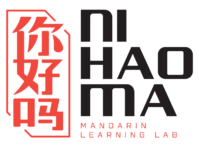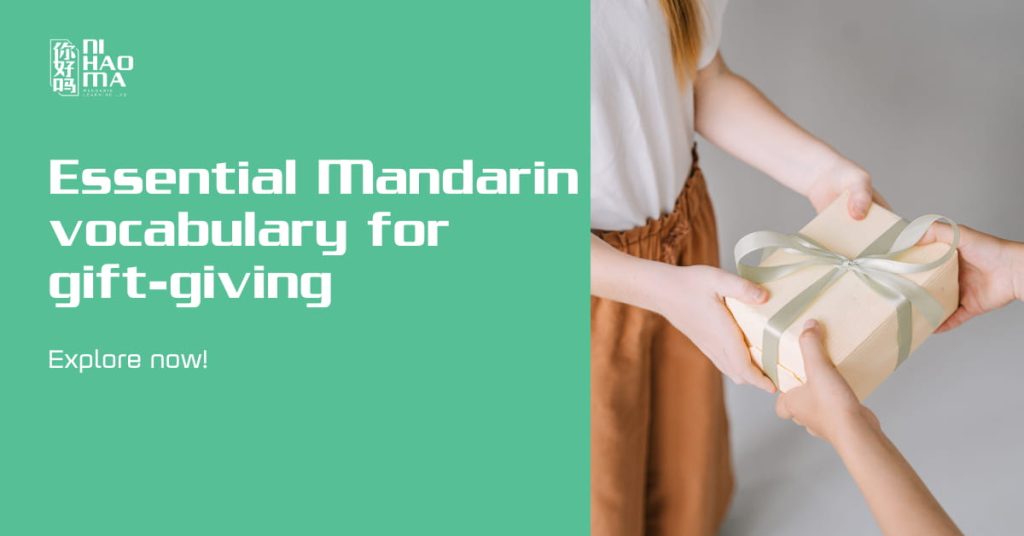Christmas isn’t just a major celebration in Western countries — it’s also widely recognized and celebrated around the world, including in Chinese-speaking countries. If you have Chinese-speaking friends or business partners and want to send them heartfelt holiday wishes but aren’t sure what is Christmas in Chinese, this article is for you. Let’s explore with Ni Hao Ma the most useful Chinese Christmas vocabulary and some cheerful holiday greetings you can use this season!
What is Christmas in Chinese?
In Chinese, Christmas is called 圣诞节 (shèng dàn jié). This is the standard term used in Chinese-speaking communities to refer to Christmas — the holiday that celebrates the birth of Jesus Christ, traditionally observed on December 25th.
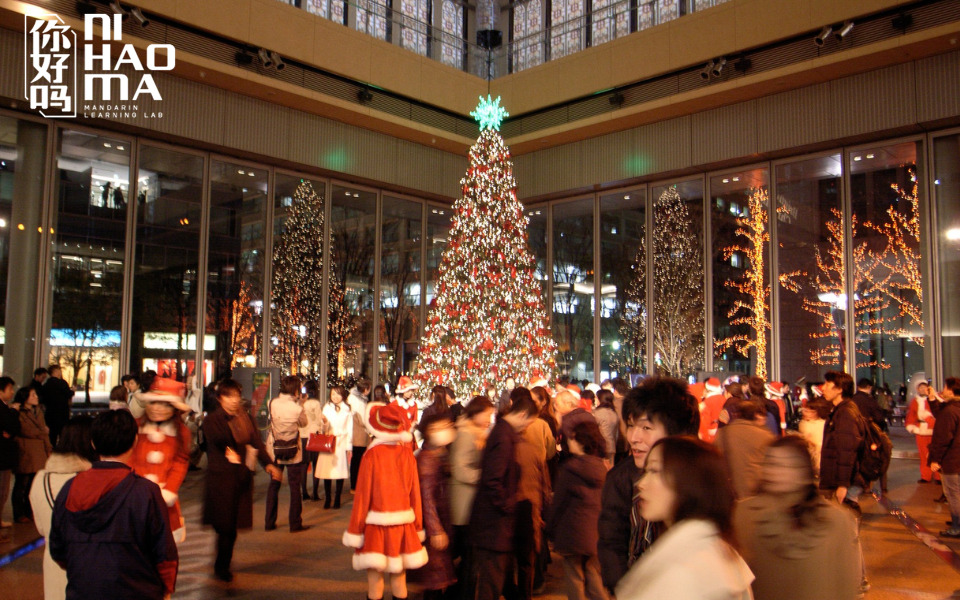
The word 圣诞节 (shèng dàn jié) is composed of three Chinese characters:
- 圣 (shèng): holy, sacred
- 诞 (dàn): to be born
- 节 (jié): festival or holiday
When combined, 圣诞节 literally translates to “Holy Birth Festival”, referring to the birth of Christ. While not a traditional holiday in China, Christmas is increasingly embraced, especially among young people. In modern China, it’s often seen as a time for celebration, exchanging gifts, and decorating homes and public spaces.
Christmas Vocabulary in Chinese
The sounds of cheerful carols, the glow of decorated Christmas trees, and festive lights all mark the holiday season. Christmas has become a global celebration — not just in the West but also throughout many Asian countries. Below is a list of Christmas vocabulary in Chinese you can use in conversations or during holiday activities.
Christmas Decoration Vocabulary in Chinese
In major cities, Christmas decorations like glittering trees and twinkling lights are everywhere. But how do you say these festive items in Chinese?
| Chinese | Pinyin | Meaning |
|---|---|---|
| 圣诞树 | shèng dàn shù | Christmas tree |
| 彩灯 | cǎi dēng | String lights |
| 彩带 | cǎi dài | Tinsel |
| 铃铛 | líng dāng | Bell |
| 圣诞花圈 | shèng dàn huā quān | Christmas wreath |
| 圣诞球 | shèng dàn qiú | Christmas bauble |
| 雪花 | xuěhuā | Snowflake |
| 雪花装饰 | xuě huā zhuāng shì | Snowflake decoration |
| 圣诞袜 | shèng dàn wà | Christmas stocking |
| 礼品盒 | lǐ pǐn hé | Gift box (for decoration) |
| 圣诞帽 | shèng dàn mào | Santa hat |
| 雪人摆件 | xuě rén bǎi jiàn | Snowman ornament |
| 驯鹿装饰 | xún lù zhuāng shì | Reindeer decoration |
| 圣诞老人的雕像 | shèng dàn lǎo rén de diāo xiàng | Santa Claus figurine |
| 蜡烛 | là zhú | Candle |
| 松果 | sōngguǒ | Pine cone |
| 丝带 | sīdài | Ribbon |
| 雪橇 | xuěqiāo | Sleigh |
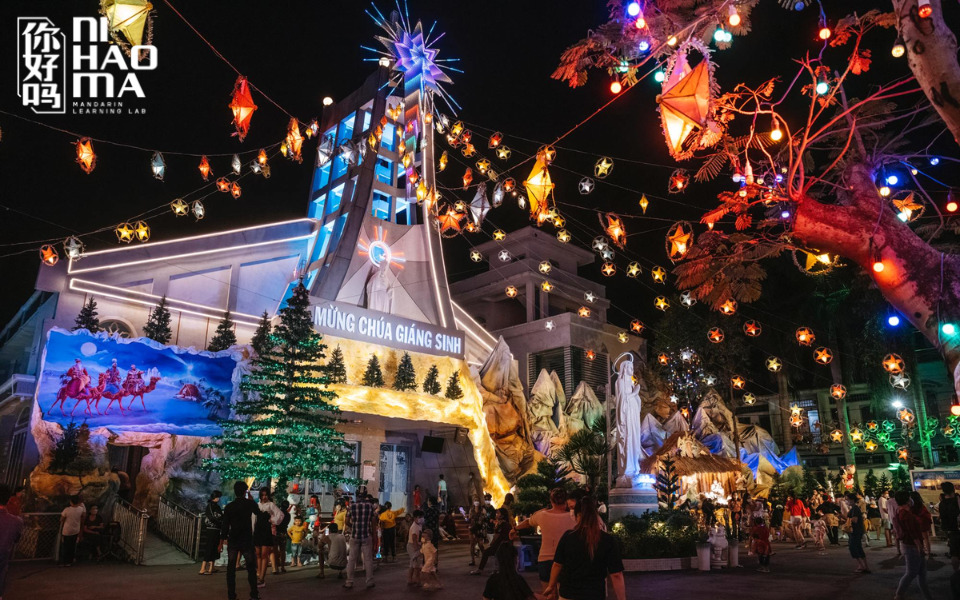
Christmas Gift Vocabulary in Chinese
Christmas is also the season for giving — whether it’s exchanging gifts or simply gathering with loved ones. Here are the most common Christmas gifts in Chinese and how to say them:
| Chinese | Pinyin | Meaning |
|---|---|---|
| 礼物 | lǐwù | Gift |
| 圣诞礼物 | shèngdàn lǐwù | Christmas gift |
| 圣诞贺卡 | shèngdàn hèkǎ | Christmas card |
| 红包 | hóngbāo | Red envelope (cash gift) |
| 饼干 | bǐnggān | Cookies |
| 蛋糕 | dàngāo | Cake |
| 姜饼人 | jiāng bǐng rén | Gingerbread man |
| 糖果 | tángguǒ | Candy |
| 巧克力 | qiǎokèlì | Chocolate |
| 红酒 | hóng jiǔ | Red wine |
| 玩具 | wánjù | Toys |
| 服装 | fúzhuāng | Clothing |
| 鞋子 | xiézi | Shoes |
| 帽子 | màozi | Hat |
| 围巾 | wéijīn | Scarf |
| 手套 | shǒutào | Gloves |
| 毛衣 | máo yī | Sweater |
| 包包 | bāobāo | Bag |
| 首饰 | shǒushì | Jewelry |
| 手表 | shǒubiǎo | Watch |
| 香水 | xiāngshuǐ | Perfume |
| 化妆品 | huàzhuāngpǐn | Cosmetics |
| 护手霜 | hù shǒu shuāng | Hand cream |
| 耳机 | ěrjī | Headphones |
| 相机 | xiàngjī | Camera |
See also: Vocabulary for Toys in Chinese
Christmas in Chinese: Essential Vocabulary
Whether you’re chatting with Chinese-speaking friends or crafting a festive blog post, knowing what is Christmas in Chinese and the related terms will help you join the holiday fun!
| Chinese | Pinyin | Meaning |
|---|---|---|
| 平安夜 | píng ān yè | Christmas Eve (Dec 24) |
| 圣诞老人 | shèng dàn lǎo rén | Santa Claus |
| 圣诞大餐 | shèng dàn dà cān | Christmas feast |
| 圣诞歌 | shèng dàn gē | Christmas carol |
| 圣诞晚会 | shèng dàn wǎn huì | Christmas party |
| 雪人 | xuě rén | Snowman |
| 驯鹿 | xún lù | Reindeer |
| 圣诞袜 | shèng dàn wà | Christmas stocking |
| 烤火鸡 | kǎo huǒ jī | Roast turkey |
| 烟囱 | yān cōng | Chimney |
| 壁炉 | bì lú | Fireplace |
| 装饰品 | zhuāng shì pǐn | Ornament / decoration |
| 烟花 | yān huā | Fireworks |
| 包装纸 | bāo zhuāng zhǐ | Wrapping paper |
| 天使 | tiān shǐ | Angel |
| 天主教 | tiān zhǔ jiào | Catholicism |
| 祷告 | dǎo gào | Prayer |
| 耶稣 | yē sū | Jesus |
| 教堂 | jiào táng | Church |
| 圣诞马槽 | shèng dàn mǎ cáo | Nativity manger |
| 颂歌 | sòng gē | Hymn |
| 送礼物 | sòng lǐ wù | To give a gift |
| 拆礼物 | chāi lǐ wù | To open a gift |
| 派对 | pài duì | Party |
| 冬天 | dōng tiān | Winter |
| 堆雪人 | duī xuě rén | To build a snowman |
| 圣诞祝福 | shèng dàn zhù fú | Christmas blessings / wishes |
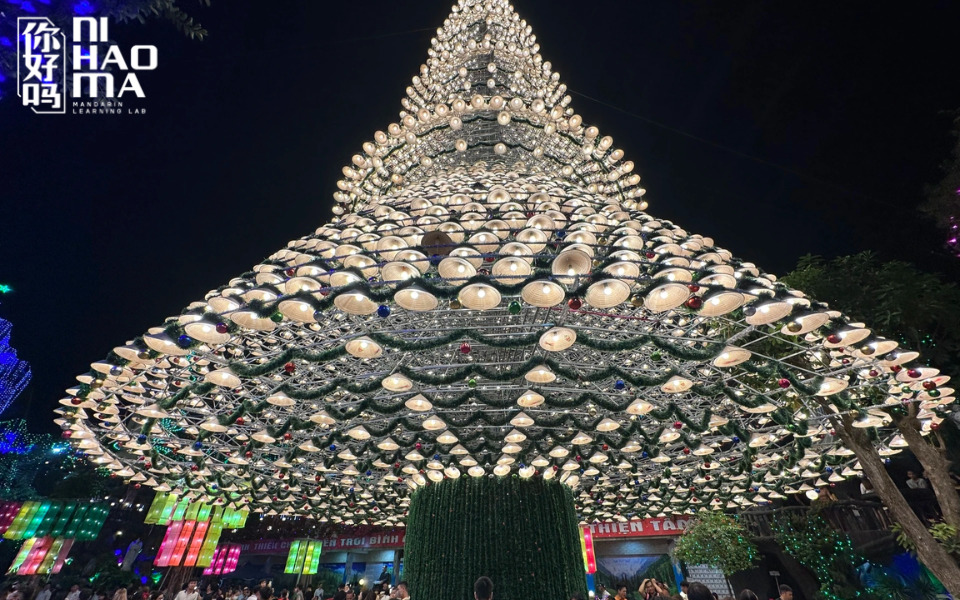
Christmas Greetings in Chinese
Though Christmas originated in the West, it’s now celebrated worldwide—including in Chinese-speaking regions. Use these warm and meaningful Chinese Christmas greetings to spread holiday cheer:
| Chinese | Pinyin | Meaning |
|---|---|---|
| 圣诞快乐! | Shèngdàn kuàilè! | Merry Christmas! |
| 祝你圣诞节幸福、快乐! | Zhù nǐ shèngdàn jié xìngfú, kuàilè! | Wishing you happiness and joy this Christmas! |
| 愿你度过一个温馨又快乐的圣诞节! | Yuàn nǐ dùguò yīgè wēnxīn yòu kuàilè de shèngdàn jié! | May you have a warm and joyful Christmas! |
| 祝你和家人圣诞快乐,幸福安康! | Zhù nǐ hé jiārén shèngdàn kuàilè, xìngfú ānkāng! | Wishing you and your family a merry, happy, and peaceful Christmas! |
| 愿圣诞老人为你带来好运和惊喜! | Yuàn shèngdàn lǎorén wèi nǐ dàilái hǎo yùn hé jīngxǐ! | May Santa Claus bring you luck and surprises! |
| 祝你和你的家人圣诞快乐,万事如意! | Zhù nǐ hé nǐ de jiārén shèngdàn kuàilè, wànshì rúyì! | Wishing you and your family a Christmas filled with all good things! |
| 愿你所有的圣诞愿望都成真! | Yuàn nǐ suǒyǒu de shèngdàn yuànwàng dōu chéng zhēn! | May all your Christmas wishes come true! |
| 愿你度过一个充满爱和快乐的圣诞节! | Yuàn nǐ dùguò yīgè chōngmǎn ài hé kuàilè de Shèngdàn jié! | Wishing you a Christmas full of love and joy! |
| 祝你度过一个难忘的圣诞节! | Zhù nǐ dùguò yīgè nánwàng de Shèngdàn jié! | Wishing you an unforgettable Christmas! |
Christmas in Chinese: Sample Dialogues
Practicing short conversations is a great way to internalize vocabulary and sound natural. Below are three extended dialogues all centered around Christmas in Chinese.
Dialogue 1: Getting Ready for Christmas
A: 圣诞节快到了,你准备好庆祝了吗?
(Shèngdàn jié kuài dào le, nǐ zhǔnbèi hǎo qìngzhù le ma?)
Christmas is coming soon—have you made your plans?
B: 还在准备呢,我打算买一棵圣诞树,还要买一些装饰品。你呢?
(Hái zài zhǔnbèi ne, wǒ dǎsuàn mǎi yī kē shèngdàn shù, hái yào mǎi yīxiē zhuāngshì pǐn. Nǐ ne?)
I’m still preparing—planning to get a Christmas tree and some decorations. What about you?
A: 我已经买好了礼物,还准备了圣诞晚餐,要请家人和朋友一起过节。
(Wǒ yǐjīng mǎi hǎo le lǐwù, hái zhǔnbèi le shèngdàn wǎncān, yào qǐng jiārén hé péngyǒu yīqǐ guòjié.)
I’ve already bought gifts and planned a Christmas dinner—I’ll invite family and friends over.
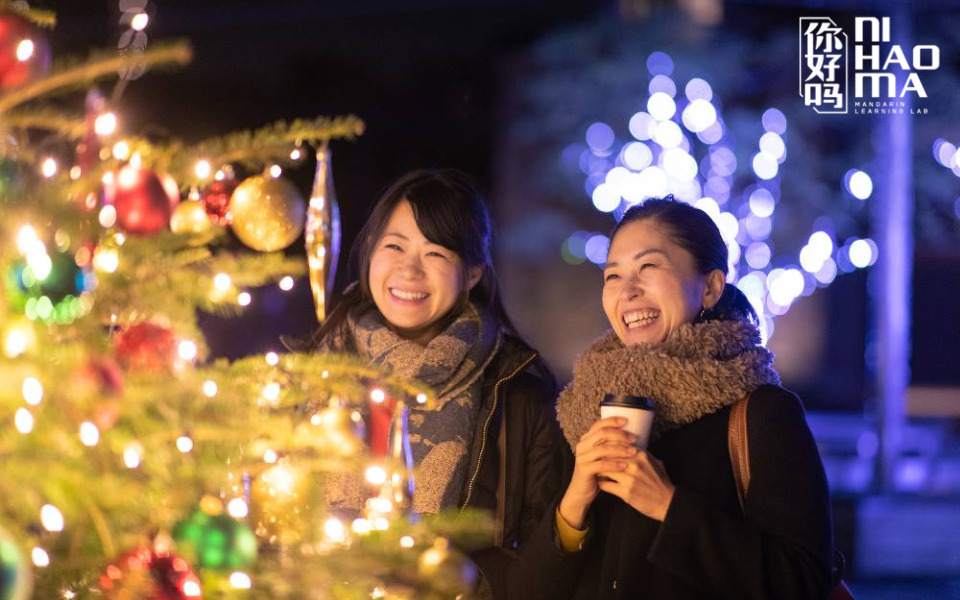
Dialogue 2: Choosing Gifts
A: 圣诞节快到了,你打算送什么礼物给你的朋友?
(Shèngdàn jié kuài dào le, nǐ dǎsuàn sòng shénme lǐwù gěi nǐ de péngyǒu?)
Christmas’s almost here—what gift will you give your friend?
B: 我准备送一本书,因为他喜欢读书。你呢?你会送什么?
(Wǒ zhǔnbèi sòng yī běn shū, yīnwèi tā xǐhuan dúshū. Nǐ ne? Nǐ huì sòng shénme?)
I’m getting him a book—he loves reading. What about you?
A: 我想送一个音乐盒,因为我的朋友喜欢音乐,而且很有纪念意义。
(Wǒ xiǎng sòng yī gè yīnyuè hé, yīnwèi wǒ de péngyǒu xǐhuan yīnyuè, érqiě hěn yǒu jìniàn yìyì.)
I’ll give a music box—my friend loves music, and it’s a memorable gift.
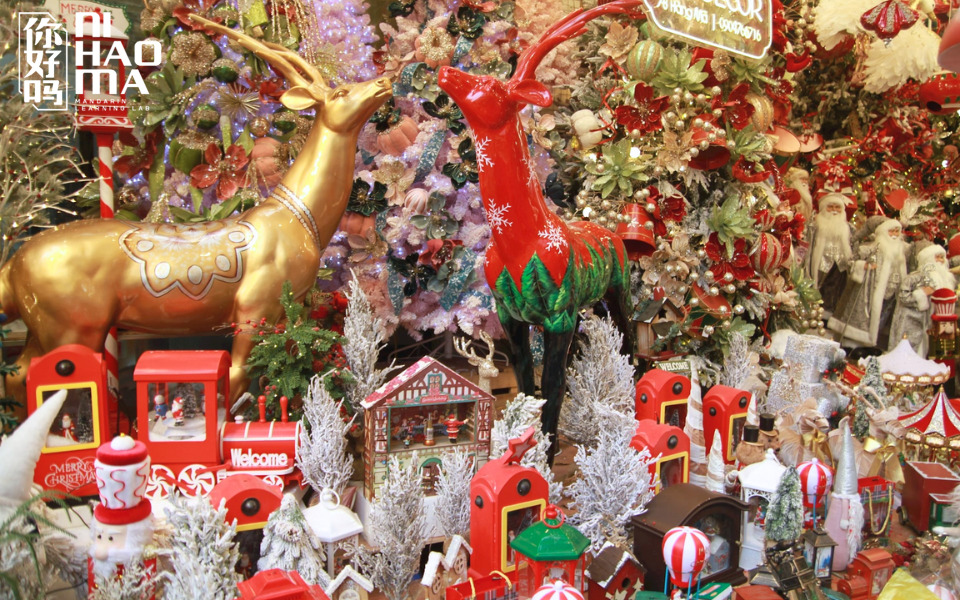
Dialogue 3: Christmas Day Plans
A: 你今年圣诞节有什么特别的计划吗?
(Nǐ jīnnián shèngdàn jié yǒu shénme tèbié de jìhuà ma?)
Do you have any special plans for Christmas this year?
B: 我打算和朋友们一起去滑冰,然后去吃圣诞大餐。你呢?
(Wǒ dǎsuàn hé péngyǒumen yīqǐ qù huábīng, ránhòu qù chī shèngdàn dàcān. Nǐ ne?)
I plan to go ice-skating with friends, then enjoy a Christmas feast. You?
A: 我可能会去教堂参加圣诞弥撒,之后跟家人一起看圣诞电影。
(Wǒ kěnéng huì qù jiàotáng cānjiā shèngdàn míshā, zhīhòu gēn jiārén yīqǐ kàn shèngdàn diànyǐng.)
I might attend a Christmas Mass at church and later watch holiday movies with my family.
Conclusion
Through this article, you’ve learned what is Christmas in Chinese and become familiar with commonly used vocabulary related to the holiday, helping you communicate more naturally in Chinese. Learning Chinese through practical topics like this can greatly enhance your language skills and improve vocabulary retention. Don’t forget to apply these words in your daily conversations—and stay tuned for more exciting content from Ni Hao Ma!
